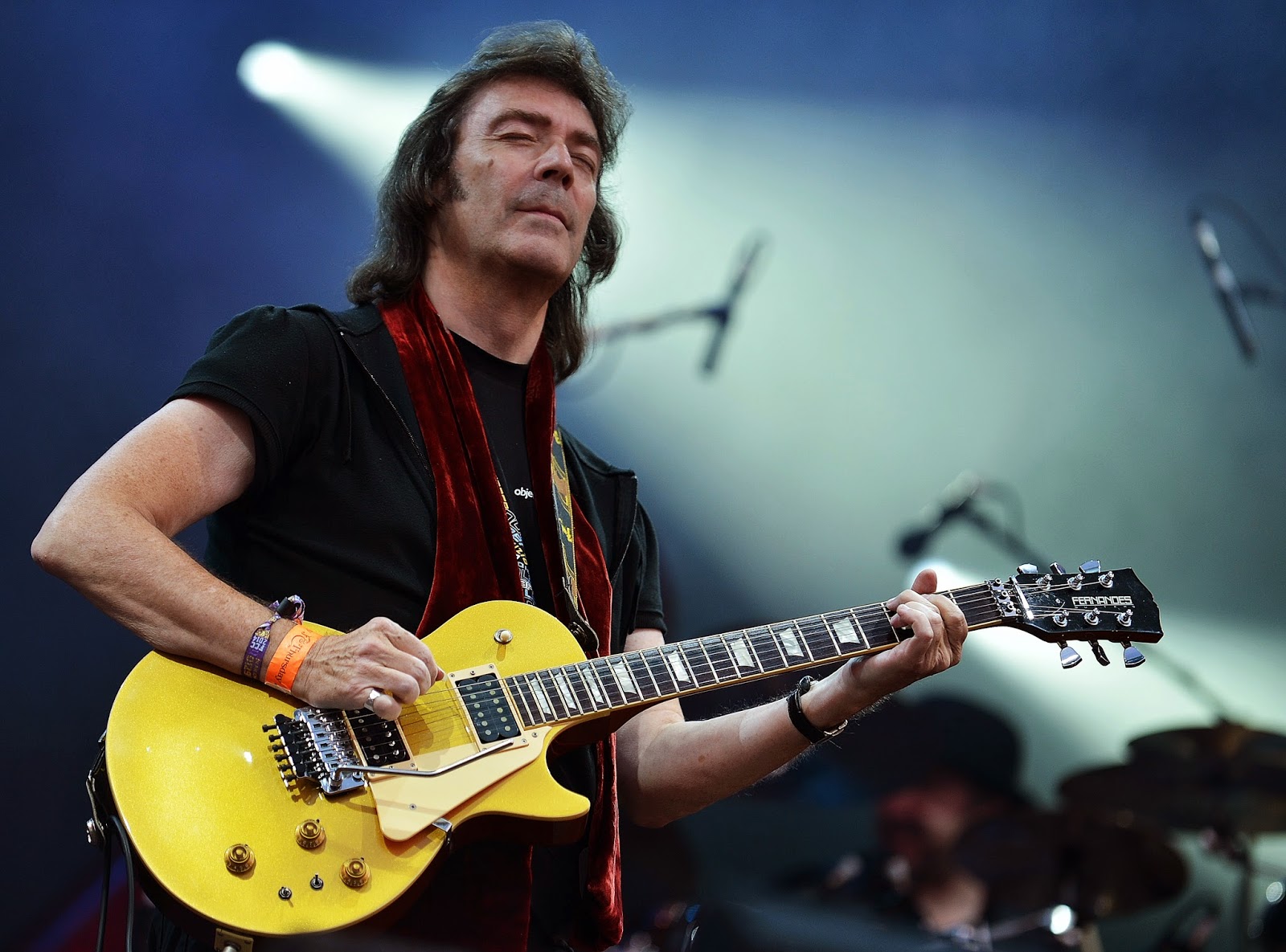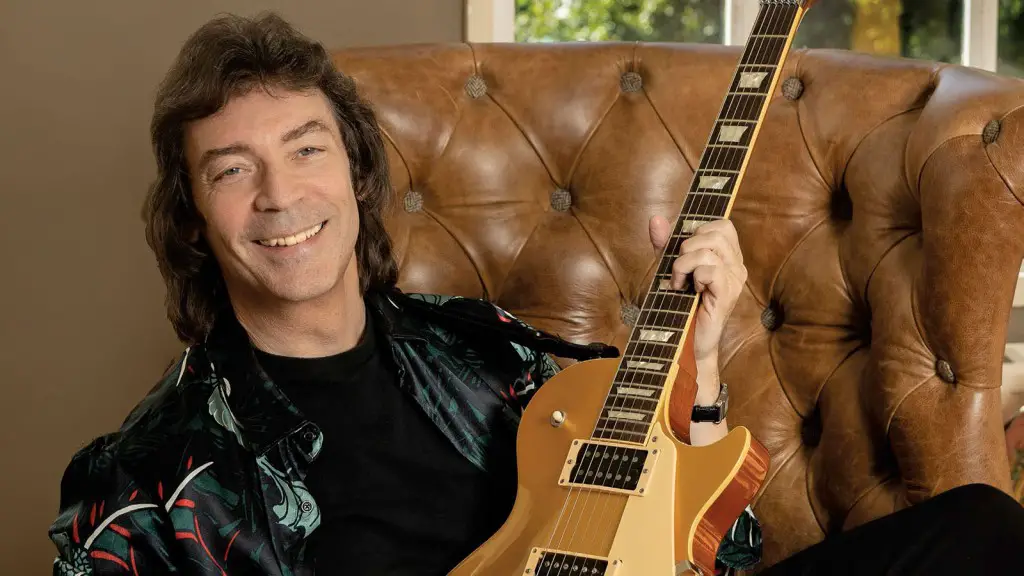All images courtesy of Chipster PR

In the pantheon of great guitar players, some stand out more than others. Steve Hackett is one of those players. His style and influence are about as far-reaching as it gets when it comes to the guitar as an instrument. Steve Hackett’s early explorations of two-handed tapping and sweep picking were far ahead of their time and influenced the likes of Eddie Van Halen, Randy Rhodes, and an entire generation of guitarists to come.
Steve’s work with Genesis as well as his solo work lays bare a body of work that is second to none. Simply put, Steve Hackett’s work and influence speaks for itself. It’s classic, it’s experimental and it’s transcendent. It’s my pleasure to have Steve Hackett “in the house” today for an interview. With that being said, I would like to direct you to Steve’s website here, where can find a copy of his new album Under A Mediterranean Sky. It’s a real journey. Alright, that’s it for me now. Let’s do this!
Andrew:
Steve, thank you for taking the time to speak with us. It’s been a weird year, hasn’t it? What have you been doing to pass the time?
Steve:
It for sure has been a weird year! I had to return to the UK in March halfway through a North American tour. Since that time, I’ve been recording. One of these projects is my new album Under A Mediterranean Sky which comes out this month.
Andrew:
Tell us about about your backstory. How did you get into music? What was the gateway so to speak?
My dad played several instruments and gave me a harmonica when I was two years of age. I was playing tunes on it by the age of four. Later on, I enjoyed playing Dad’s guitar. Music was always in my blood and from my mid-teens onwards, I knew I wanted to be a professional musician.
Andrew:
As an artist and guitarist, who were some of your earliest and more important influences?
Steve;
My earliest influences were Hank Marvin of the Shadows and Andrés Segovia. Soon after, I was impressed by Brian Jones on electric guitar and Paul Butterfield on harmonica. A bit later I really got into Jimi Hendrix.

Andrew:
You joined Genesis in 1970, right? Tell us how you ended up with the gig.
Steve:
I advertised in the music journal Melody Maker and Peter Gabriel of Genesis responded to it. He and Tony Banks took me on after they auditioned me.
Andrew:
You were with Genesis for 7 years and released some incredible albums. Looking back, what are your thoughts on your time with the band? What led you to finally leave in 1977?
Steve:
I learned a lot with the band and I enjoyed much of what we did together. It was a time of growth artistically and we gained an increasing amount of notoriety. Eventually, I wanted to create my own albums as well as being in Genesis. Two of the band members didn’t want me to have my own parallel career, but I needed to spread my creative wings, so I left.
Andrew:
In 1975, you released your first solo record, Voyage of the Acolyte. What are your thoughts on that record? Since then, you’ve released 25 more records, with number 26 on the way. How have you progressed since your debut? What’s changed.
Steve:
I’ve always been proud of Voyage of the Acolyte, which had a great reaction. It had a magical feel and a fabulous team, which involved some of the Genesis guys as well as others. I feel that I’ve developed artistically since that time, and I’m particularly pleased with my most recent albums.
Andrew:
Speaking of your upcoming new record on the way, what can you tell us about Under a Mediterranean Sky? What was the inspiration, and what was the recording process like? Where can we get the record and what formats will it be on?
Steve:
The inspiration for the new acoustic album was from the many different cultures of that region, giving a wide musical pallet. The music on this album ranges from classical guitar and orchestra to more wild and exotic influences from the Sahara and the Middle East involving instruments like the tar from Azerbaijan and the duduk from Armenia. The recording process worked fine, with a lot of file sharing, because I did it all during the spring lockdown period. You can get the record via my website www.hackettsongs.com and it will be on both CD and vinyl.
Andrew:
As an artist, you’ve moved across seemingly all genres of music, from Progressive Rock, Blues, Pop, and even Classical. What keeps you moving from genre to genre? What are your thoughts on the idea of genre constraints in general?
Steve:
I don’t believe that there need to be constraints. I love to celebrate different genres and even to blend them together at times. It’s an exciting area to develop musical ideas through a combination of genres and styles.
Andrew:
A lot of guitarists have been lauded for their two-handed tapping, but that is actually something you were doing well ahead of most. Your style and technique were far ahead of their time, really. How did you develop your two-handed tapping and sweep picking style?
Steve:
I was trying to play some Bach-like phrases one day. Sweep picking copies the action that violinists use, rocking the bow whilst the other hand is in a fixed position and tapping uses the fretboard more like a keyboard.

Andrew:
In 2010, you were inducted into the Rock and Roll Hall of Fame with Genesis. How gratifying was that for you?
Steve:
I found it a very emotional evening. I think the Rock and Roll Hall of Fame is a great institution and I am proud to be a part of it.
Andrew:
There has been talk of a reunion of the classic 1970-1975 Genesis lineup for years, but it hasn’t come together. Is there a chance we ever see that line up tour or record together again?
Steve:
It would be nice but it seems unlikely.
Andrew:
In July of 2020, you released an autobiography called A Genesis in My Bed. Tell us about your new book, and where we can find a copy.
Steve:
The book covers my whole life, gives an overview of my time with Genesis, and answers many questions fans have asked over the years. I enjoyed the process. You can find a copy via my website www.hackettsongs.com and also from Amazon.

Andrew:
In the world we live in today, we are more or less dominated by the never-ending barrage of social media. Is an artist’s ability to get their music out there hindered by all this, or helped?
Steve:
Social media is a good advertising platform. You have to make it work for you.
Andrew:
What are a few albums that mean the most to you and why?
Steve:
The Beatles’ Sergeant Pepper has always been a favorite. It’s a precursor to Progressive music and came out at a time of great creativity. I enjoyed King Crimson’s In The Court Of The Crimson King because of its pan genre arc. I love Buffy Sainte Marie’s It’s My Way for its commitment to political and social change.
Andrew:
Aside from music, what else are you most passionate about and why? How do your other passions inform and inspire your music?
Steve:
I’m passionate about books which give a window on the imagination of others, and several of these have inspired subjects for music. Art itself is an inspiration. I also love to travel. Many places around the world give a whole new perspective on culture and music.

Andrew:
What type of guitars and gear are you using these days?
I still use my Gibson Les Paul as well as the Fernandes with its sustainer pickup. I also have several classical guitars, most of which are Japanese. Plus I use a dobro, banjo, Arabian lute, Peruvian charango, and a guitar sitar. For amplification live, I use an Engel and at home a Sans Amp, amongst other things.
Andrew:
Are you into vinyl? Tapes? CDs? Or are you all digital now? Where do you like to shop for music?
Steve:
Vinyl provides extra compression and distortion. It can make things sound very powerful, especially if it’s Rock. For Classical I prefer CDs. I work with all formats. I go to local shops when possible, but they’re as rare as antique shops these days! Otherwise, from Amazon etc.
Andrew:
Last question. In a world that’s been so confined by the constraints of big business and the alienation caused due to the internet age, how do artists find their footing these days? What advice would you have for younger artists?
Steve:
Play as many shows as you can (when it’s possible again!) Love what you do, make as many contacts as you can, and put out as much as possible via every platform.

Interested in sampling the music of Steve Hackett? Check out the link below:
Dig this interview? Check out the full archives of Vinyl Writer Interviews, by Andrew Daly, here: www.vinylwritermusic.com/interviews





Leave a Reply